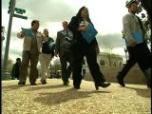Issues and Action
 Americans share many blessings and strengths, including a tradition of religious freedom and political participation. However, as a people, we face serious challenges that are clearly political and also profoundly moral in nature.
Americans share many blessings and strengths, including a tradition of religious freedom and political participation. However, as a people, we face serious challenges that are clearly political and also profoundly moral in nature.
We are a nation founded on "life, liberty, and the pursuit of happiness," but the right to life itself is not fully protected, especially for unborn children, the most vulnerable members of the American family. We are called to be peacemakers in a nation at war. We are a country pledged to pursue "liberty and justice for all," but we are too often divided across lines of race, ethnicity, and economic inequality.
We are a nation of immigrants, struggling to address the challenges of many new immigrants in our midst. We are a society built on the strength of our families, called to defend marriage and offer moral and economic supports for family life. We are a powerful nation in a violent world, confronting terror and trying to build a safer, more just, more peaceful world. We are an affluent society where too many live in poverty and lack health care and other necessities of life. We are part of a global community facing urgent threats to the environment that must sustain us. These challenges are at the heart of public life and at the center of the pursuit of the common good.
As Catholics, we are part of a community with a rich heritage that helps us consider the challenges in public life and contribute to greater justice and peace for all people. As Catholics, we are part of a community with a rich heritage that helps us consider the challenges in public life and contribute to greater justice and peace for all peoplePart of that rich heritage on faithful citizenship is the teaching of Vatican Council II's Declaration on Religious Liberty (Dignitatis Humanae). It says that"society itself may enjoy the benefits of justice and peace, which result from [people's] faithfulness to God and his holy will" (no. 6). The work for justice requires that the mind and the heart of Catholics be educated and formed to know and practice the whole faith.
In this section of our Web site, you will find information and resources that highlight the role of the Church in the formation of conscience, and the corresponding moral responsibility of each Catholic to hear, receive, and act upon the Church's teaching in the lifelong task of forming his or her own conscience. With this foundation, Catholics are better able to evaluate policy positions, party platforms, and candidates' promises and actions in light of the Gospel and the moral and social teaching of the Church in order to help build a better world.
---excerpted from "Forming Consciences for Faithful Citizenship:A Call to Political Responsibility from the Catholic Bishops of the United States Conference of Catholic Bishops."
